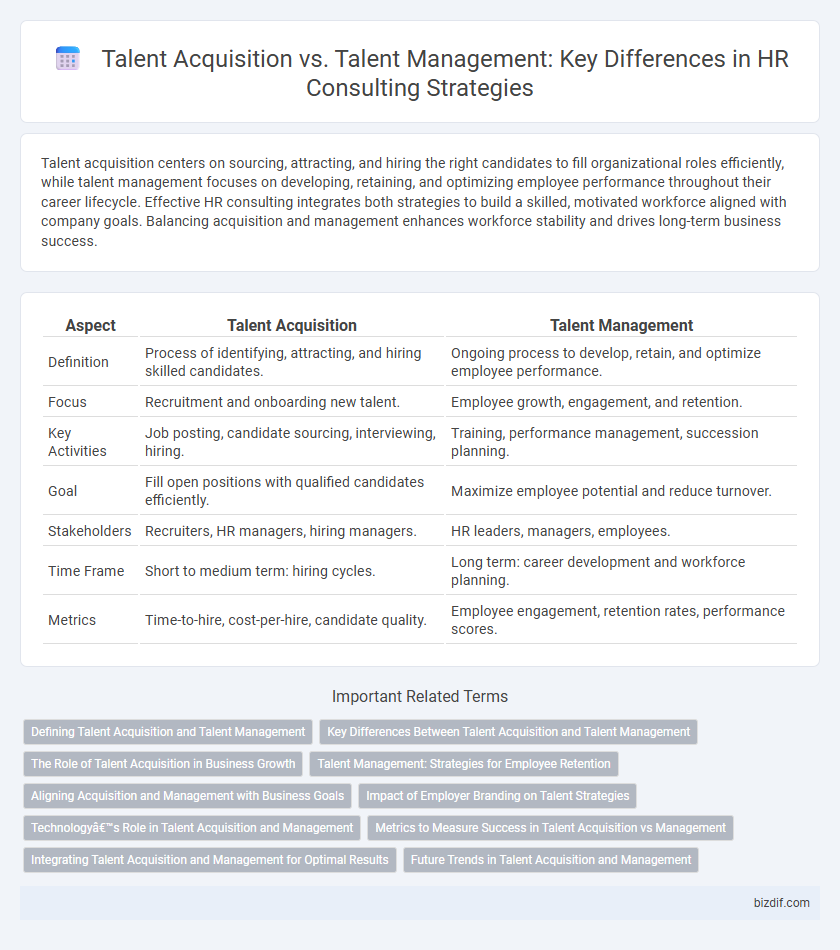Talent acquisition centers on sourcing, attracting, and hiring the right candidates to fill organizational roles efficiently, while talent management focuses on developing, retaining, and optimizing employee performance throughout their career lifecycle. Effective HR consulting integrates both strategies to build a skilled, motivated workforce aligned with company goals. Balancing acquisition and management enhances workforce stability and drives long-term business success.
Table of Comparison
| Aspect | Talent Acquisition | Talent Management |
|---|---|---|
| Definition | Process of identifying, attracting, and hiring skilled candidates. | Ongoing process to develop, retain, and optimize employee performance. |
| Focus | Recruitment and onboarding new talent. | Employee growth, engagement, and retention. |
| Key Activities | Job posting, candidate sourcing, interviewing, hiring. | Training, performance management, succession planning. |
| Goal | Fill open positions with qualified candidates efficiently. | Maximize employee potential and reduce turnover. |
| Stakeholders | Recruiters, HR managers, hiring managers. | HR leaders, managers, employees. |
| Time Frame | Short to medium term: hiring cycles. | Long term: career development and workforce planning. |
| Metrics | Time-to-hire, cost-per-hire, candidate quality. | Employee engagement, retention rates, performance scores. |
Defining Talent Acquisition and Talent Management
Talent Acquisition is the strategic process of identifying, attracting, and recruiting skilled candidates to meet an organization's workforce needs, leveraging techniques like employer branding, talent sourcing, and candidate assessment. Talent Management encompasses the ongoing development, retention, and performance optimization of employees through training, career planning, and succession management to maximize organizational effectiveness. Both functions are critical for building a sustainable workforce and aligning human capital with business goals.
Key Differences Between Talent Acquisition and Talent Management
Talent acquisition focuses on the strategic process of identifying, attracting, and recruiting the best candidates to fill open positions, emphasizing workforce planning and employer branding. Talent management encompasses ongoing employee development, retention, performance management, and career progression to maximize employee potential and organizational growth. Key differences include talent acquisition's emphasis on recruitment metrics and sourcing strategies, while talent management prioritizes engagement, training, succession planning, and employee lifecycle management.
The Role of Talent Acquisition in Business Growth
Talent acquisition drives business growth by identifying and securing top-tier candidates who align with organizational goals, ensuring long-term success and competitive advantage. Effective talent acquisition strategies reduce time-to-hire and improve employee retention, directly impacting productivity and revenue. Integrating data analytics with talent acquisition optimizes workforce planning and supports scalable expansion in dynamic markets.
Talent Management: Strategies for Employee Retention
Talent Management emphasizes strategies for employee retention by focusing on continuous development, career progression, and engagement initiatives that foster loyalty and reduce turnover. Effective talent management integrates personalized training programs, performance feedback, and succession planning to maintain a motivated workforce aligned with organizational goals. Retention strategies also leverage data-driven insights to identify flight risks and implement targeted interventions to sustain long-term employee commitment.
Aligning Acquisition and Management with Business Goals
Aligning talent acquisition and talent management with business goals ensures a cohesive strategy that drives organizational success. Talent acquisition focuses on sourcing candidates who fit the company's culture and future needs, while talent management develops and retains these individuals through targeted learning and performance initiatives. Coordinating these processes enhances workforce agility, boosts productivity, and supports long-term business objectives.
Impact of Employer Branding on Talent Strategies
Employer branding plays a crucial role in shaping both talent acquisition and talent management strategies by enhancing an organization's reputation and attractiveness to top candidates. Strong employer branding reduces time-to-hire and improves candidate quality while also increasing employee engagement and retention in talent management. Investing in authentic employer value propositions drives competitive advantage in recruiting and sustaining high-performance workforce talent pools.
Technology’s Role in Talent Acquisition and Management
Technology plays a transformative role in both talent acquisition and talent management by leveraging AI-driven tools and predictive analytics to enhance candidate sourcing, screening, and employee performance tracking. Advanced applicant tracking systems (ATS) and talent management platforms streamline recruitment processes, improve decision-making, and personalize employee development plans. Integrating these technologies enables HR teams to optimize workforce planning, boost employee engagement, and retain top talent more effectively.
Metrics to Measure Success in Talent Acquisition vs Management
Talent acquisition success is measured through metrics such as time-to-fill, cost-per-hire, quality of hire, and candidate satisfaction scores, highlighting recruitment efficiency and talent quality. Talent management focuses on employee engagement, retention rate, performance appraisal scores, and internal mobility, reflecting workforce development and productivity. Effective HR consulting integrates these metrics to align recruitment strategies with long-term talent growth and organizational goals.
Integrating Talent Acquisition and Management for Optimal Results
Integrating talent acquisition and talent management drives continuous employee development and retention, aligning recruitment strategies with long-term organizational goals. This synergy enhances workforce agility by ensuring that new hires possess skills that fit evolving business needs while providing existing employees with growth opportunities. Effective collaboration between acquisition and management teams maximizes talent ROI and strengthens overall business performance.
Future Trends in Talent Acquisition and Management
Future trends in talent acquisition emphasize leveraging artificial intelligence and data analytics to enhance candidate sourcing, assessment, and personalized recruitment strategies. Talent management is increasingly adopting continuous learning platforms and employee experience technologies to boost retention, engagement, and skill development. Integration of these advanced tools drives a holistic approach, aligning talent acquisition and management with evolving workforce demands and business goals.
Talent Acquisition vs Talent Management Infographic

 bizdif.com
bizdif.com